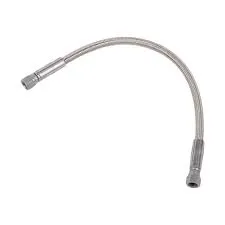Oct . 20, 2024 21:36 Back to list
Hydraulic Hose Manufacturers for CE Certification 4SP and 4SH Standards
CE Certification for 4SP/4SH Hydraulic Hose Manufacturers
In the modern industrial landscape, the demand for high-quality hydraulic hoses has surged due to the escalating needs of various sectors such as construction, agriculture, and manufacturing. Among the various categories of hydraulic hoses, the 4SP and 4SH types are particularly noteworthy. These hoses are designed to withstand high pressure and offer superior performance, making them essential for multiple applications. To ensure safety, reliability, and performance, manufacturers of 4SP and 4SH hydraulic hoses must obtain CE certification. This article aims to explore the significance of CE certification for these manufacturers and the benefits it brings to the industry.
Understanding CE Certification
CE marking is a certification mark that indicates a product's compliance with European health, safety, and environmental protection legislation. The CE stands for Conformité Européenne, reflecting the product's adherence to the necessary regulations within the European Economic Area (EEA). For manufacturers of hydraulic hoses, achieving CE certification signifies that their products meet stringent quality and safety standards, thus allowing them to market their hoses across Europe and other regions that recognize CE marking.
Importance of CE Certification for Hydraulic Hose Manufacturers
1. Safety Assurance Hydraulic hoses are often subjected to extreme pressures and harsh conditions. CE certification ensures that the hoses are tested and meet safety requirements, significantly reducing the risk of failure. This is crucial as hose failures can lead to catastrophic accidents, posing risks to both personnel and equipment.
2. Market Access CE marking is a prerequisite for selling products in the European market. Manufacturers without CE certification will find it difficult, if not impossible, to enter or compete in this lucrative market. By acquiring CE certification, 4SP and 4SH hydraulic hose manufacturers can expand their market reach, enhancing their competitiveness on a global scale.
3. Quality Assurance The certification process involves rigorous testing and quality assessments that establish the reliability of the hoses. This not only helps in maintaining high manufacturing standards but also boosts customer confidence. When buyers see the CE mark, they are assured that the product has met specific quality benchmarks, increasing the likelihood of successful sales.
ce certification 4sp/4sh hydraulic hose manufacturers

4. Regulatory Compliance The process of obtaining CE certification compels manufacturers to stay abreast of changing regulations and industry standards. This commitment to compliance not only benefits the manufacturers but also leads to the promotion of overall safety and environmental responsibility within the industry.
5. Consumer Trust In today’s marketplace, consumers are increasingly aware of safety and quality standards. Products bearing the CE mark are perceived as more trustworthy. This trust can translate into consumer loyalty and preference for brands known for their commitment to quality assurance.
6. Continuous Improvement The certification process encourages manufacturers to adopt best practices and innovate continually. As they strive to meet or exceed regulatory requirements, manufacturers are more likely to invest in research and development, resulting in superior products that cater to evolving market demands.
Challenges in Obtaining CE Certification
While the benefits of CE certification are substantial, the path to achieving it is fraught with challenges. Manufacturers must navigate the complex regulatory landscape and invest time and resources to conduct thorough product testing. Additionally, staying compliant with various directives requires ongoing monitoring and adaptation, which can strain smaller manufacturers who may lack the necessary infrastructure.
Conclusion
In conclusion, CE certification is vital for 4SP and 4SH hydraulic hose manufacturers. It not only enhances the safety and reliability of their products but also serves as a gateway to European and global markets. As industries continue to evolve and demand for high-quality hydraulic solutions grows, manufacturers who prioritize achieving and maintaining CE certification will undoubtedly position themselves for long-term success in the competitive hydraulic hose market. By committing to rigorous standards and continuous improvement, they not only safeguard their operations but also contribute positively to the industry as a whole, ensuring that hydraulic systems operate safely and efficiently across various sectors.
-
Best Four Steel Wire Spiral Hose Hydraulic R12 – Durable High-Pressure Hose Manufacturer
NewsJul.08,2025
-
High-Quality 1/4 Hydraulic Hose – Soft, Flexible & Durable Rubber Hoses for Industrial Use
NewsJul.08,2025
-
1 1 2 Inch Hydraulic Flexible Hose - Durable, Reliable, High-Pressure Solutions
NewsJul.07,2025
-
High-Quality 1 2 Rubber Hose - Durable, Flexible Hydraulic Solutions
NewsJul.07,2025
-
Discover SAE Hydraulic Hose Types - High Quality & Durable Hoses from Leading Factory Supplier
NewsJul.06,2025
-
High Pressure Wire Hydraulic Rubber Hose Supplier Durable & Reliable 1SN Hose Solutions
NewsJul.06,2025
